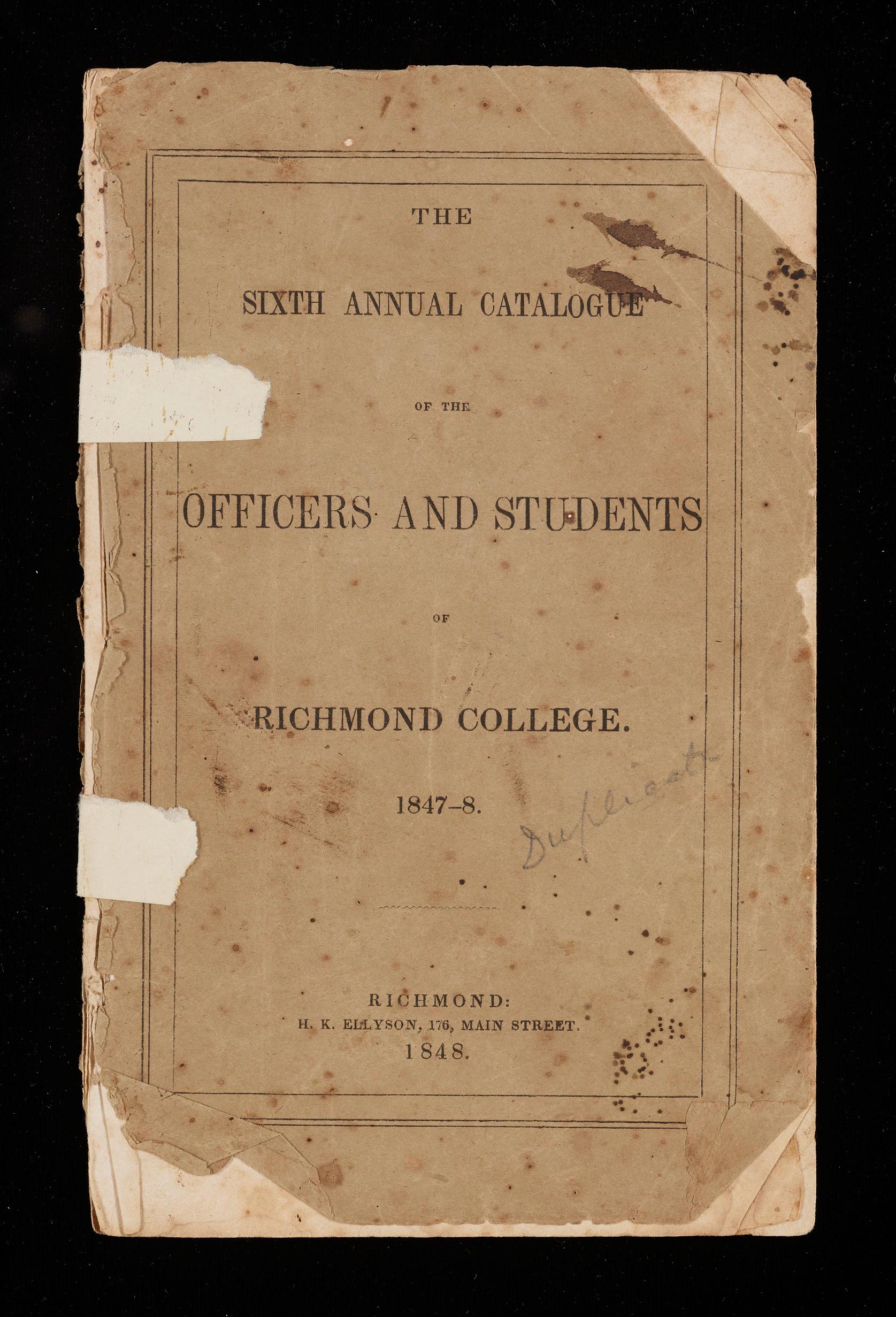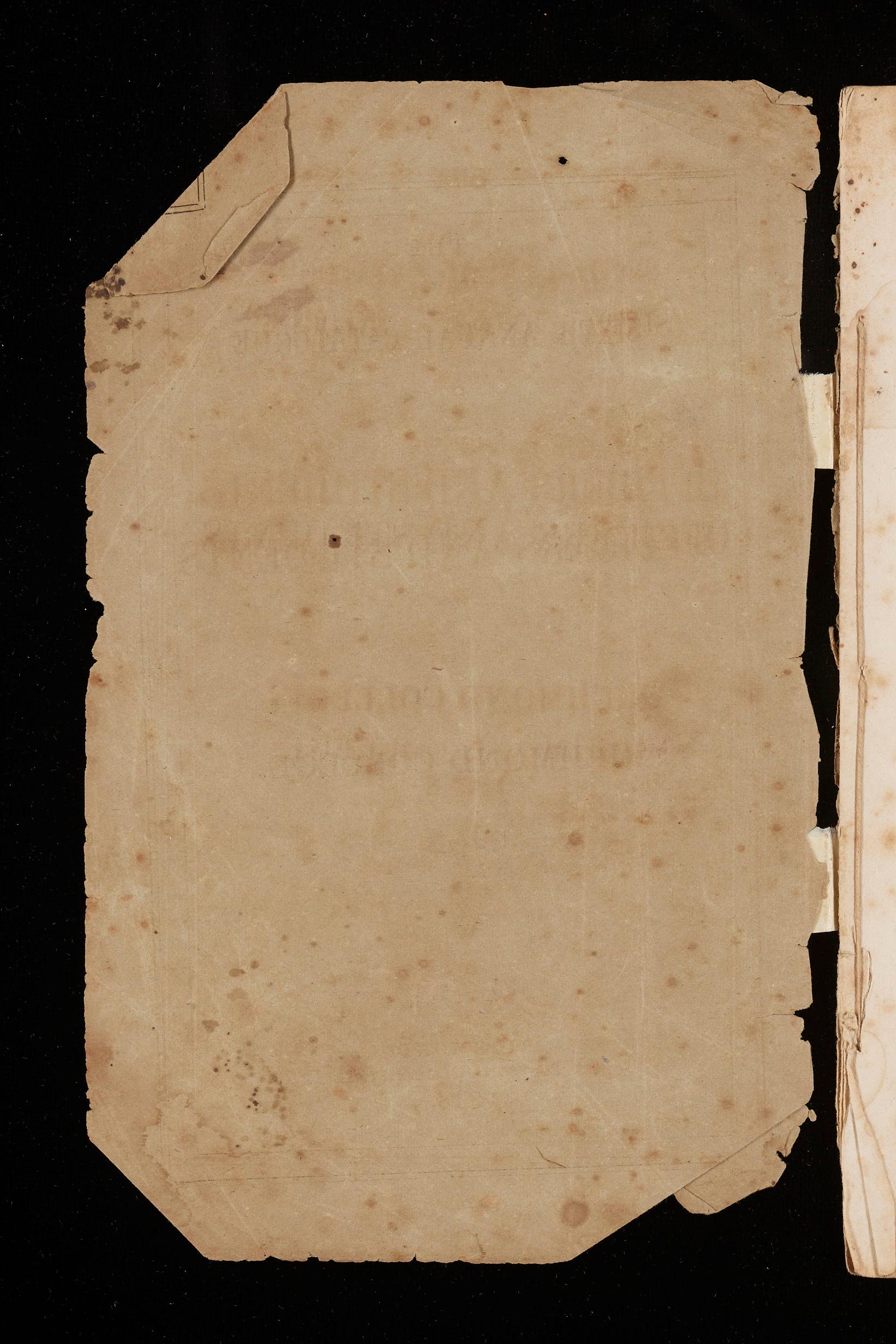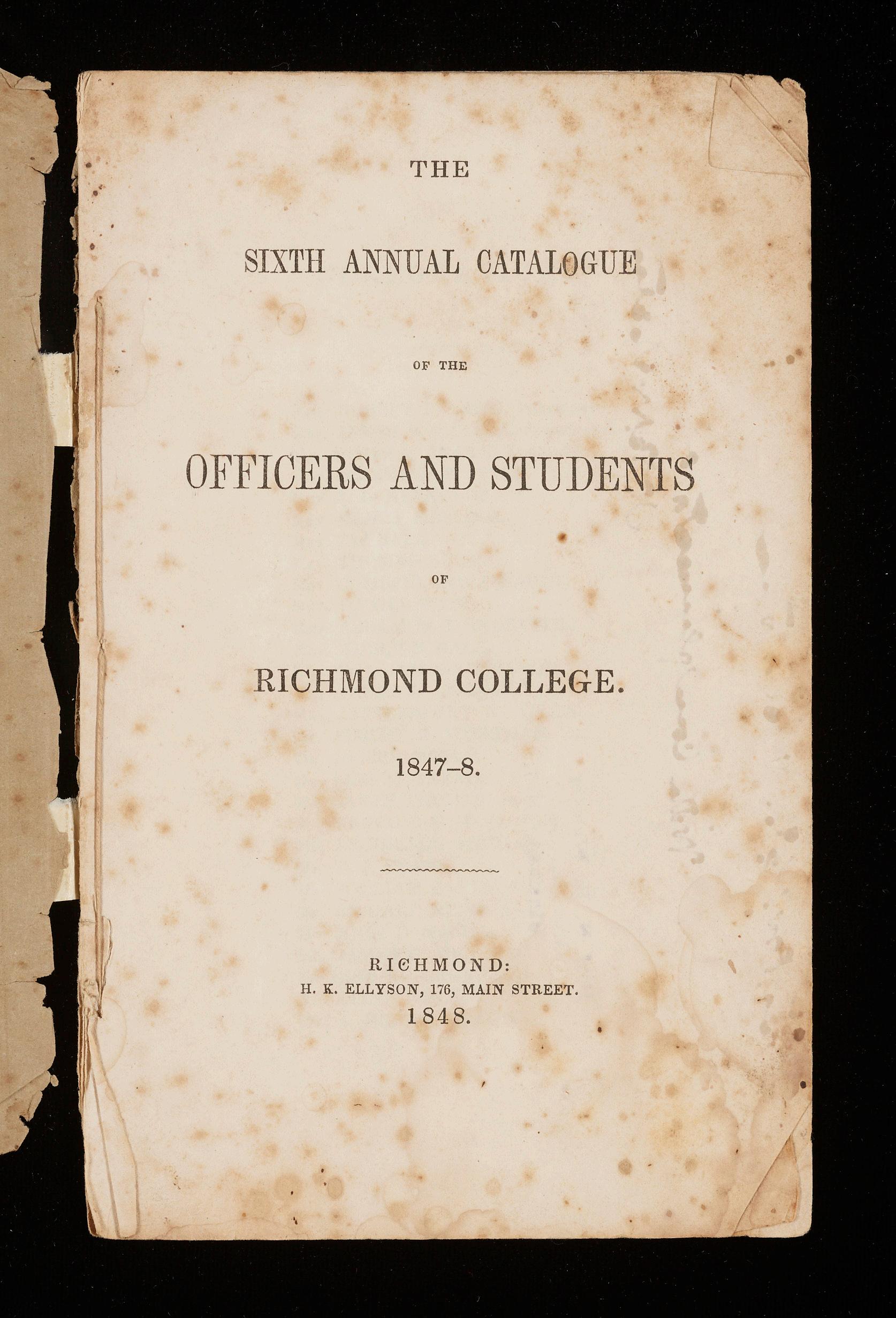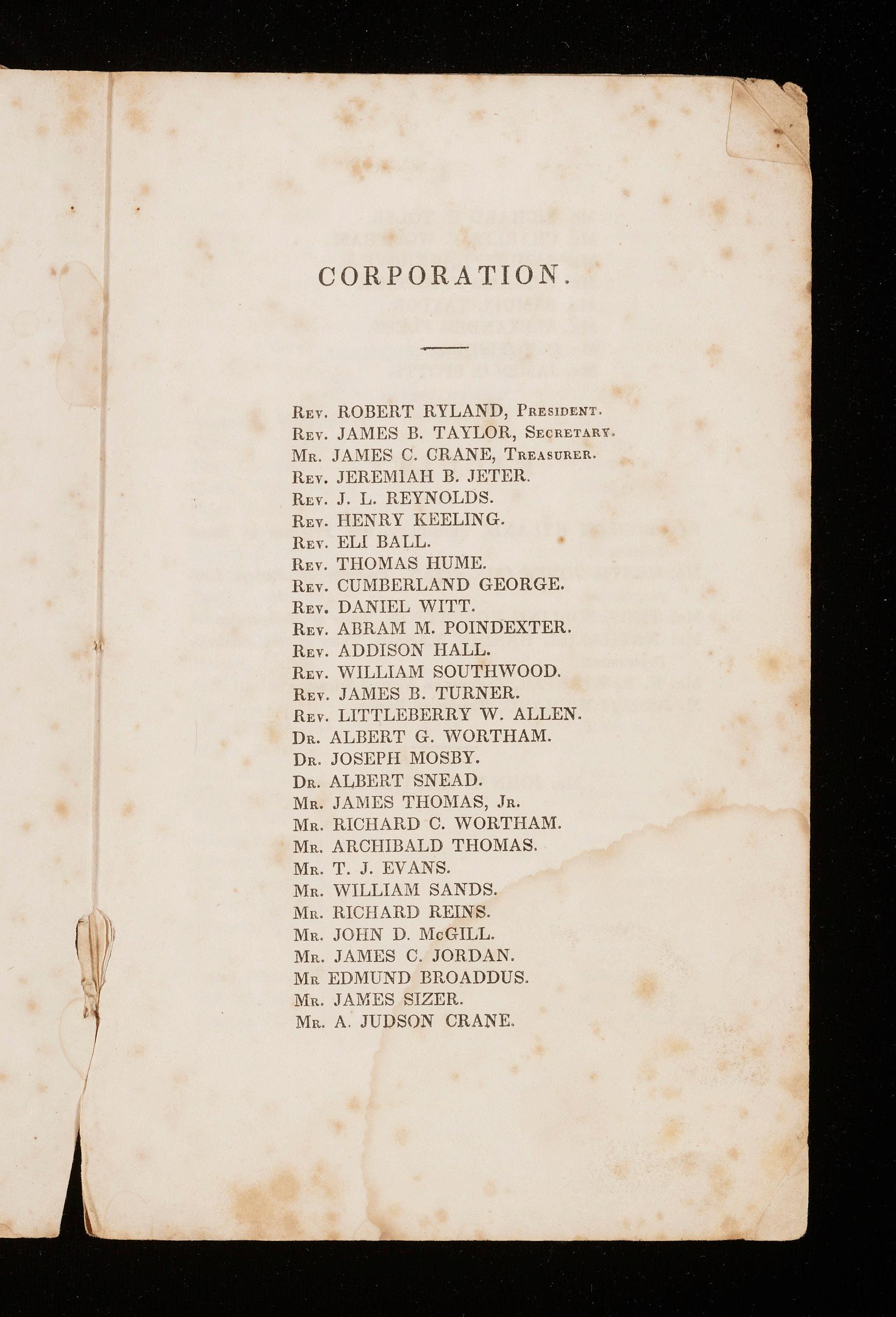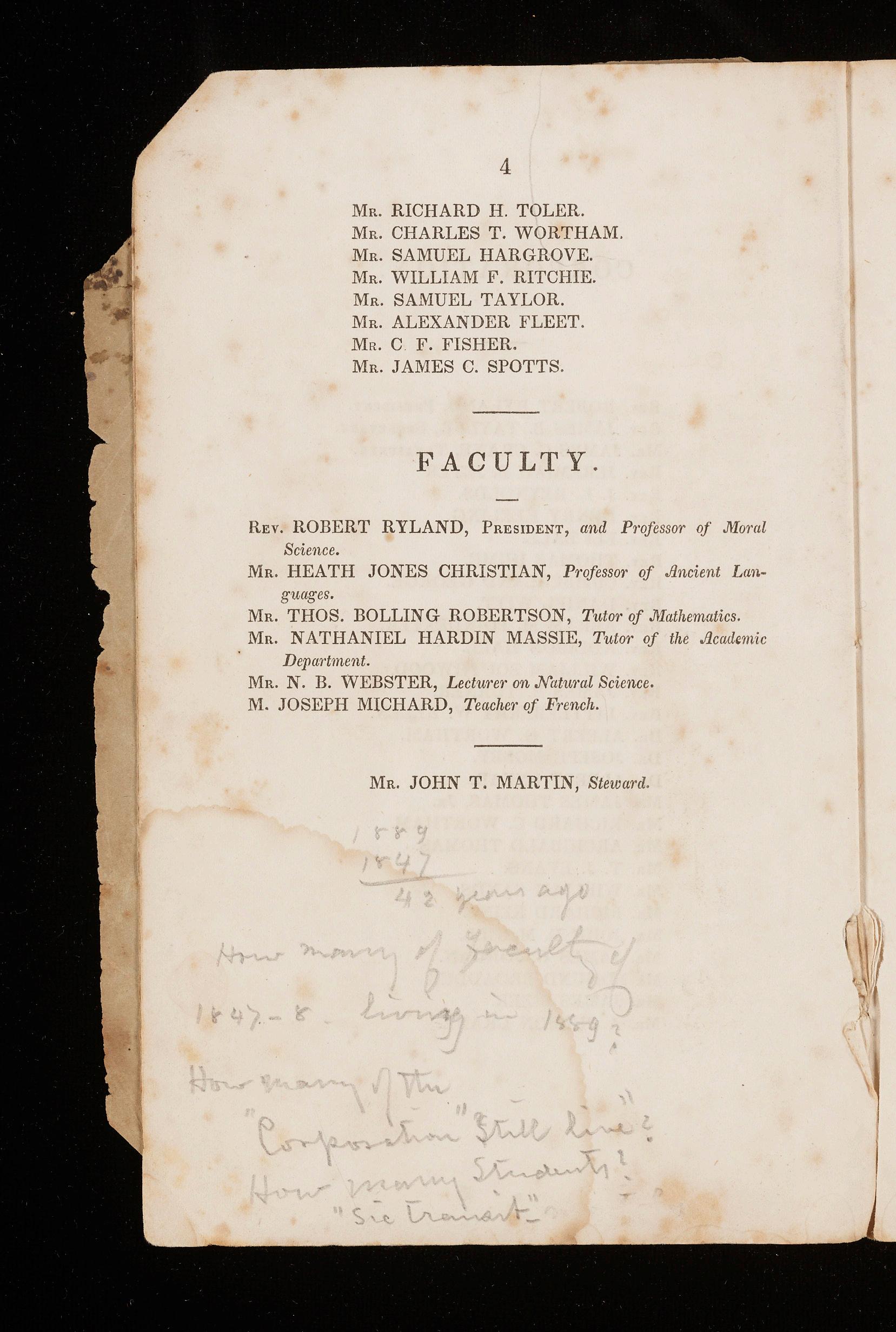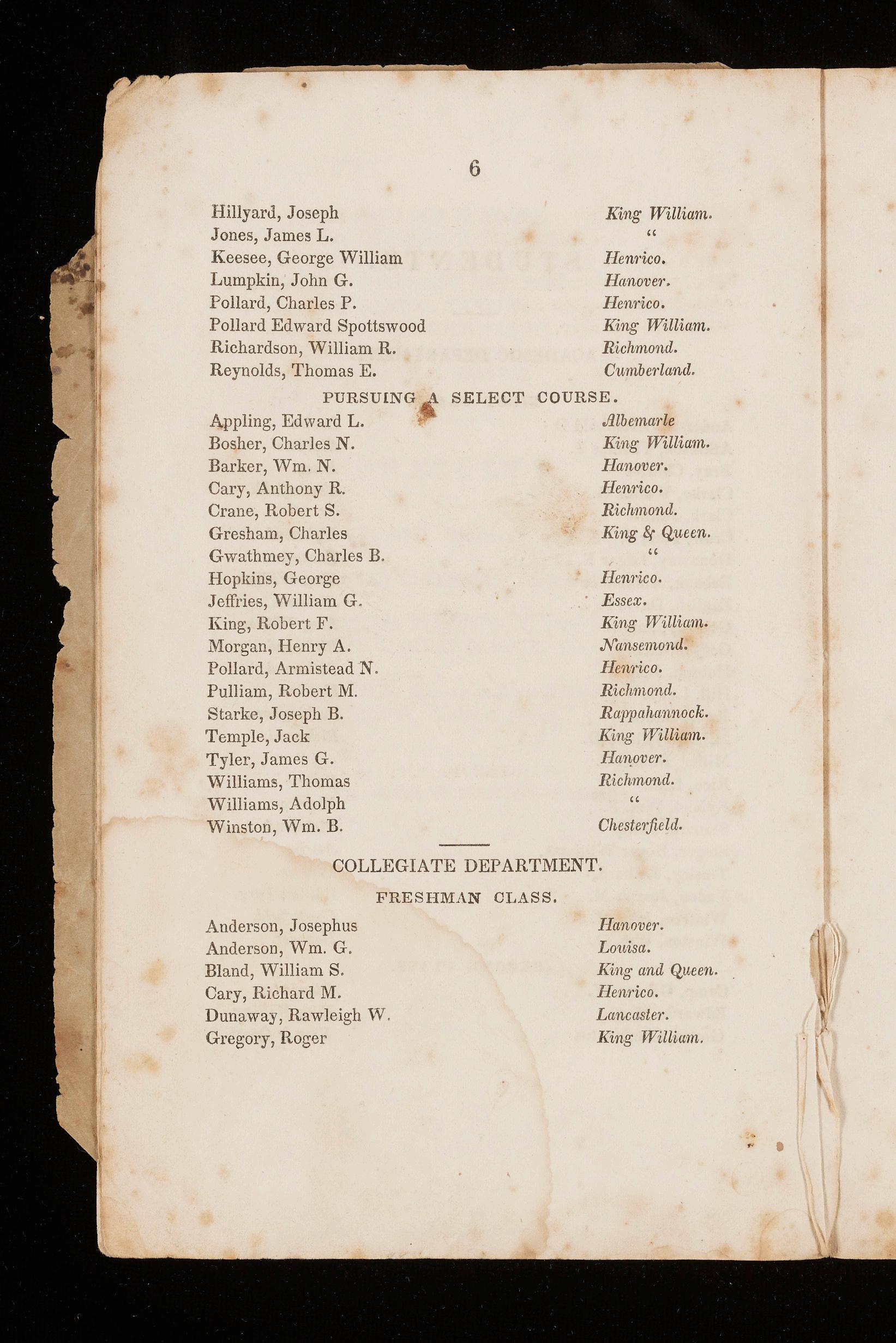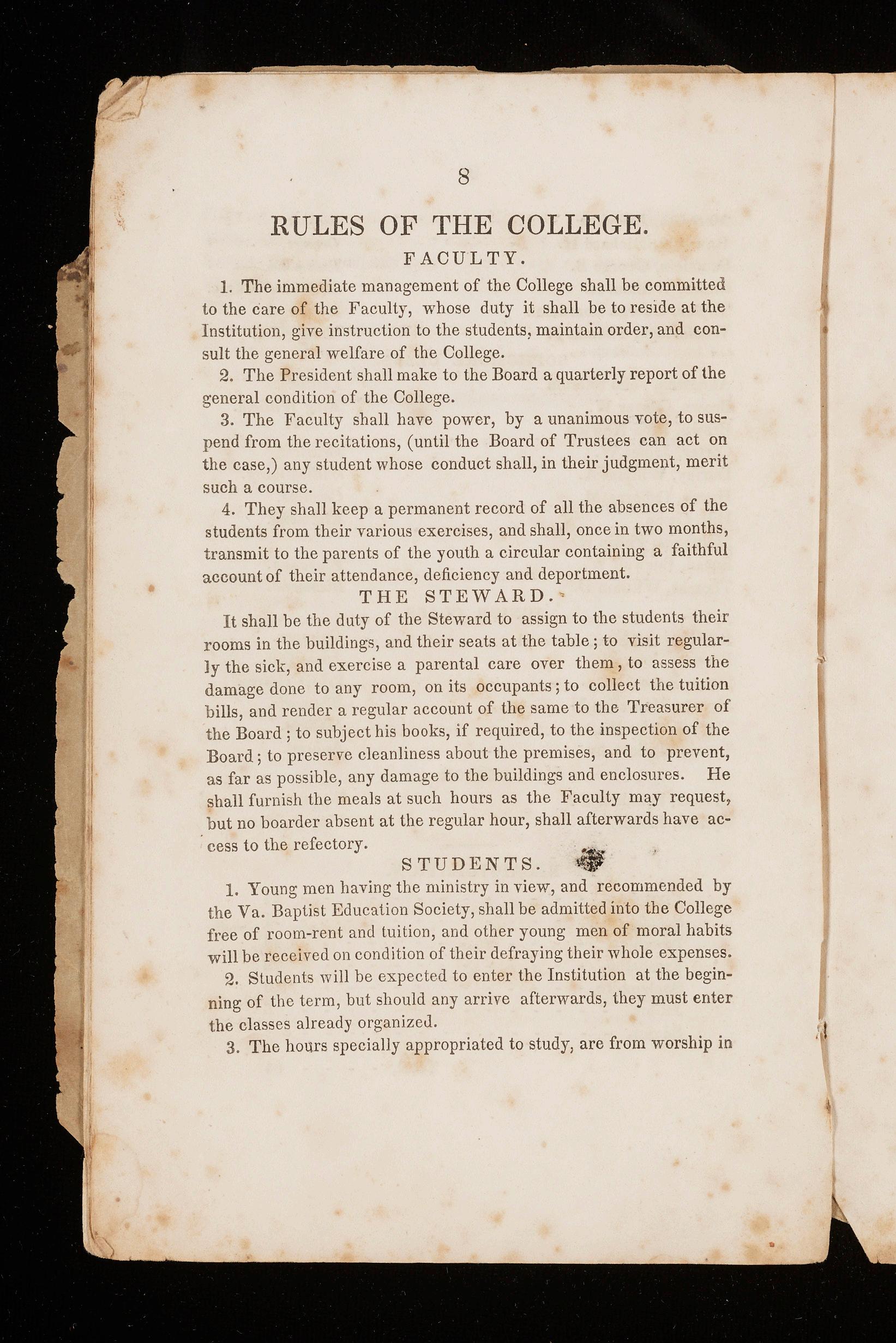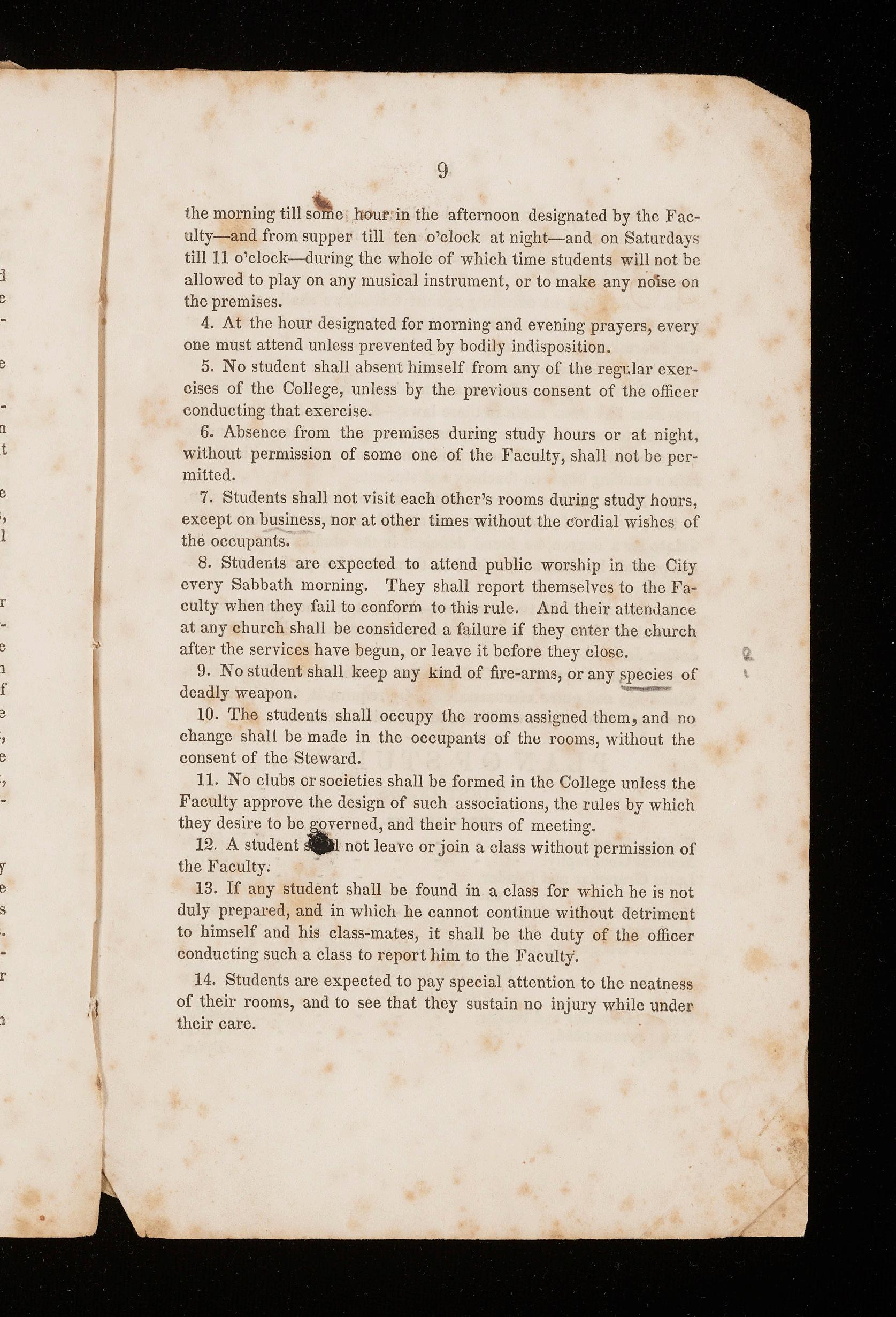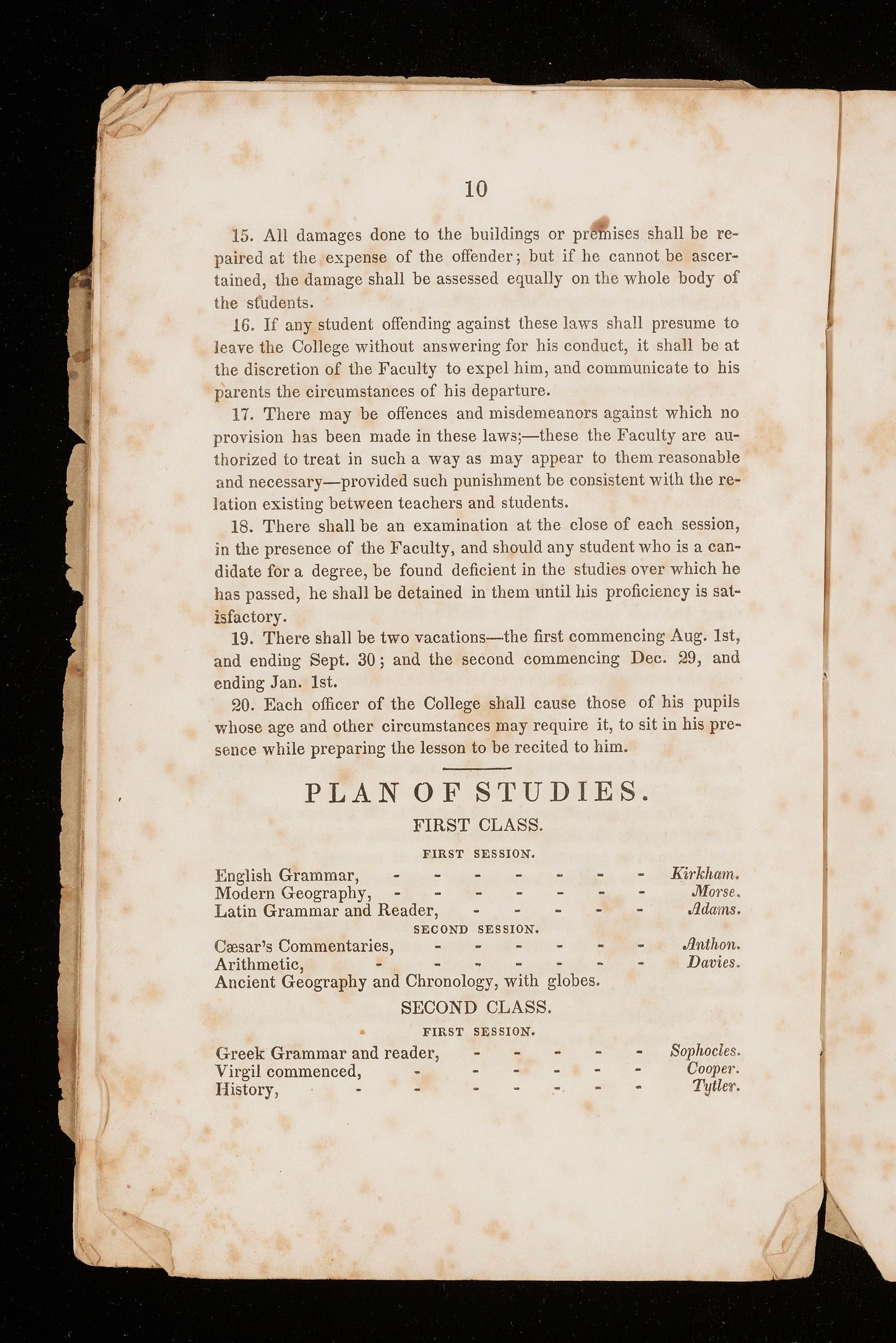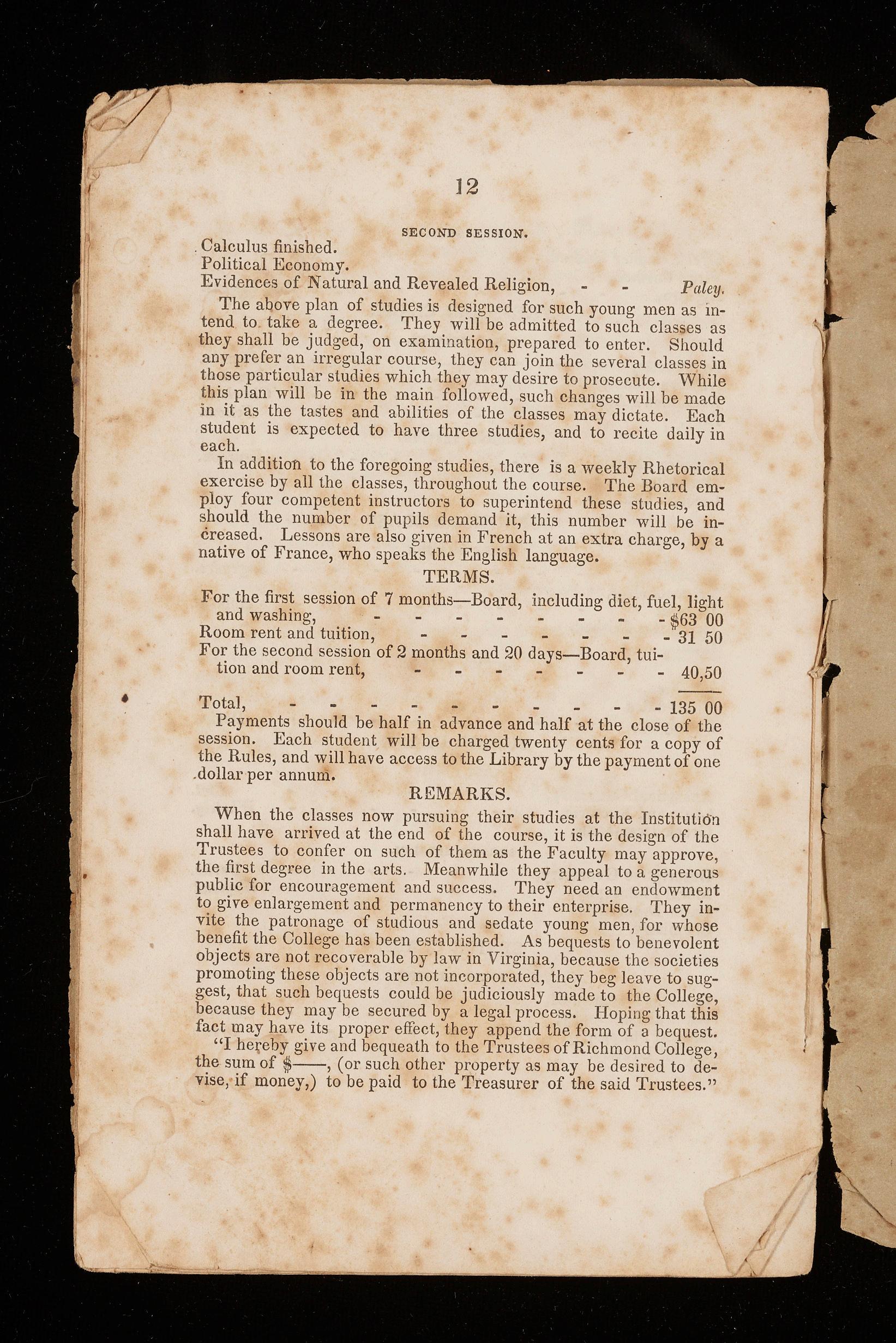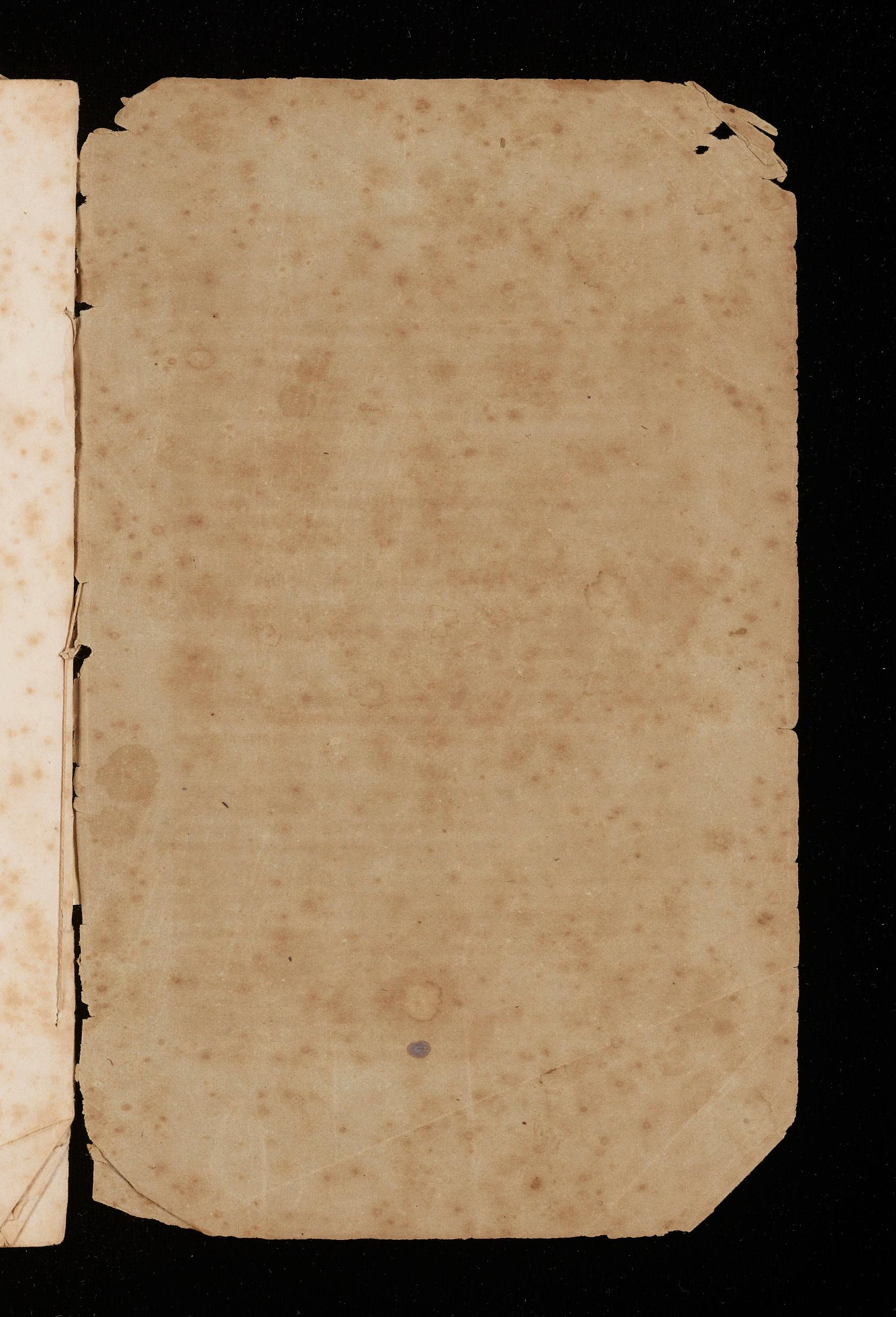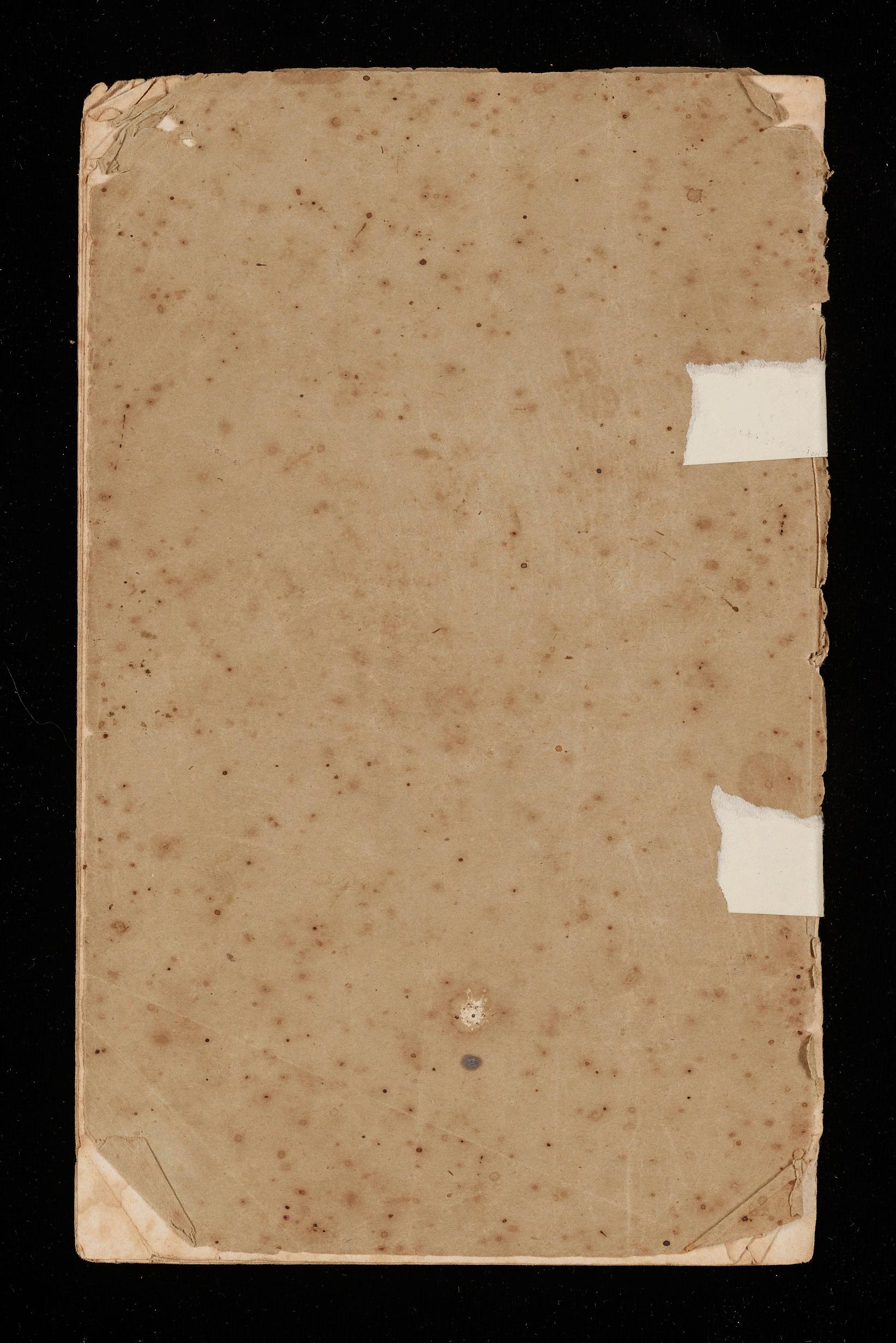RICHMOND: . H. K. EirL YSON, 176, MAIN STREET. • 1848.
THE SIXTHANNUALCATALOGUE OF THE OFFICERSANDSTUDENTS OF RICHMOND COLLEGE.
1847-8.
RIEJHMOND: H. K. ELLYSON, 176, MAIN STREET. 1848.
CORPORATION .
REV, ROBERT RYLAND, PRESIDENT.
REV, JAMES B. TAYLOR, SECRETAR Y, MR JAMES C CRANE, TREASURER
REv. JEREMIAH B. JETER.
REv, J. L. REYNOLDS.
REv. HENRY KEELING
REV. ELI BALL
REv THOMAS HUME
REv. CUMBERLAND GEORGE, REv. DANIEL WITT.
REv ABRAM M. POINDEXTER.
REv. ADDISON HALL.
REv, WILLIAM SOUTHWOOD .
REv. JAMES B. TURNER.
REv, LITTLEBERRY W ALLEN.
DR. ALBERT G. WORTHAM.
DR. JOSEPH MOSBY.
DR. ALBERT SNEAD.
MR. JAMES THOMAS, JR, MR RICHARD C. WORTHAM
MR. ARCHIBALD THOMAS.
MR. T. J . EVANS.
MR. WILLIAM SANDS.
MR RICHARD REINS
MR. JOHN D . McGILL .
MR. JAMES C JORDAN
MR EDMUND BROADDUS
MR JAMES SIZER
MR A JUDSON CRANE
MR. RICHARD H. TOLER.
MR. CHARLES T. WORTHAM.
MR. SAMUEL HARGROVE.
MR. WILLIAM F. RITCHIE.
MR. SAMUEL TAYLOR.
MR. ALEXANDER FLEET.
MR. C F. FISHER.
MR. JAMES C. SPOTTS. FACULTY.
REV. ROBERT RYLAND, PRESIDENT,and Professor of Moml Science.
MR. HEATH JONES CHRISTIAN, Professor of .!lncient L<mguages.
MR. THOS. BOLLING ROBERTSON, Tutoi· of Jlfathematics.
MR. NATHANIEL HARDIN MASSIE, Tutor of the .!lcailcmic Department.
MR. N. B. WEBSTER, Lecturei· on Naturnl Science. M. JOSEPH MICHARD, Teacher of French.
MR. JOHN T. MARTIN, Stewc,rd.
STUDENTS.
ACADEMIC DEPARTMENT.
FIRST CLASS.
Anderson, Archibald D. Atkinson, Thomas P.
Bray, Charles
Clarke, ·walter G.
Clark, Junius
Crew, Peter J.
Dunaway, Edgar E.
Eubank, Alexander
English, David P. Gregory, Junius
Gwynn, Henry
Hobson, John N. Hill, Lewis
Jones, James
Miller, William D.
Miller, Robert C. Rice, Enan
Ryland, vVm. S. Stanard, Philip
Steger, Roger 'iVilliarns, Tinsl ey , Richard, Vaden, Joseph M. Winfree, John II. Winston, Wm. D.
SECOND CLASS.
Camp, George W. Edwards, ·wm. Govan, Cincinnatus
Louisa. Jllabama Essex. Chestei:field . Richmond. Lancaster. King William Jllrtbama. King Wil/ia m. Richmond. Richmond. Henrico. Buckingham. Richmond. " Essex. Henrico. Richmond. Jlmelia. Henrico. Wi.lli amsb1l!'g. Chestei:field. Hrtnover.
Gloucester. King William. King S; Queen
Hillyard, Joseph
Jones, James L.
Keesee, George William
Lumpkin, John G.
Pollard, Charles P.
Pollard Edward Spottswood
Richardson, William R.
Reynolds, Thomas E.
PURSUlNG
Appling, Edward L.
Bosher, Charles N.
Barker, Wm. N.
Cary, Anthony R.
Crane, Robert S.
Gresham, Charles
Gwathmey, Charles B.
Hopkins, George
Jeffries, William G
King, Robert F.
Morgan, Henry A.
Pollard, Armistead N .
Pulliam, Robert M.
Starke, Joseph B.
Temple, Jack
Tyler, James G.
Williams, Thomas
Williams, Adolph
Winston, Wm. B
King William. " Henrico. Hcinover. Henrico. King Willimn. Richmond. Cumberland.
!I. SELECT COURSE.
Jllbemarle
King William. Hcmovei·. Heiii-ico. Richmond.
King 8r Queen. " Henrico. Essex. King William. Nan~emond. Henrico. Richmon1l. Rappahannock. King William. Hmwver. Richmond. " Chesteijield.
COLLEGIATE DEPARTMENT.
FRESHMAN CLASS,
Anderson, Josephus
Anderson, Wm. G .
Bland, William S.
Cary, Richard M.
Dunaway, Rawleigh W.
Gregory, Roger
Hanover. Louisa. King and Queen H e,wico. Lancaster. King William.
Meredith, Josephus
Rawlings, Richard H.
Saunders, George B.
Smith, William H.
Taylor, George Boardman
Wooldridge, Thomas J.
SOPHOMORE CLASS.
Anderson, John Shelton
Brown, Carver W.
Brown, John Newton
Carter, James W.
Durfey, William A.
Harris, Osborne M.
Hill, Owen
Montague, Philip H.
Snead, Burwell W.
Thomas, William D.
Brown, John W.
Browne, John B.
Dunn, Robert C.
Morris, Marcellus M
Tippett, John W.
Tyree, William A.
Hen son, Poindexter J. Ryland, Josiah
JUNIOR CLASS.
SENIOR, RECAPITULATION
Si!lfolk. Orange, Richmond. Richmond county. Richmond. Chesterfield.
Louisa. King William.
Henrico. Williamsburg. Caroline. Richmond. " Fluvanna. Richmond.
Citlpepar. James City. Prince George. Jllbemm·le. JIIadison. Jlmherst.
FlutJanna. King BrQueen.
RULES OF THE COLLEGE.
FACULTY.
1. The immediate management of the College shall be committed to the care of the Faculty, whose duty it shall be to reside at the Institution, give instruction to the students, maintain order, and consult the general welfare of the College.
2. The President shall make to the Board a quarterly report of the general condition of the College.
3. The Faculty shall have power, by a unanimous vote, to suspend from the recitations, (until the Board of Trustees can act on the case,) any student whose conduct shall, in their judgment, merit such a course.
4. They sha ll keep a permanent record of all the absences of the students from their various exerc ises, and shall, once in two months, transmit to the parents of the youth a circular containing a faithful account of their attendance, deficiency and deportment.
THE STEWARD. •
It shall be the duty of the Steward to assign to th e students their rooms in the buildings, and their seats at the table; to visit regularly the sick, and exercise a parental care over them, to assess the damage done to any room, on its occupants; to collect the tuition b ills, and render a regular account of the sa me to the Treasurer of the Board; to subject his books, if required, to the inspection of the Board; to pr eserve cleanliness about the premises, and to prevent, as far as possible, any damage to the buildings and enclosures. He shall furnish the meals at such hours as the Faculty may request , but no boarder absent at the regular hour, shall afterwards have ac. cess to the refectory.
STUDENTS.
1, Young men having the ministry in view, and recommended by the Va. Baptist Education Society, sha ll be admitted into the College free of room-rent and tuition, and other young men of moral habits w ill be received on condition of their defraying their whole expenses.
2. Students wi ll be expected to enter the In st itution at the beginning of the term, but should any arrive afterwards, they must enter the classes already organizetl .
3. The hours specially appropriated to study, are from worship in : I
the morning till so e hour in the afternoon designated by the Faculty-and from supper till ten o'clock at night-and on Saturdays till 11 o'clock-during the whole of which time students will not be allowed to play on any musical instrument, or to make any n·o~se on the premises.
4. At the hour designated for morning and evening prayers, every one must attend unless prevented by bodily indispo,ition.
5. No student shall absent himself from any of the reg1Jar exercises of the College, unless by the previous consent of the officer conducting that exercise.
6. Absence from the premises during study hours or at night, without permission of some one of the Faculty, shall not be permitted.
7. Students shall not visit each other's rooms during study hours, except on business, nor at other times without the c'ordial wishes of the occupants.
8. Students are expected to attend public worship in the City every Sabbath morning. They shall report themselves to the Faculty when they fail to conform to this rule. And their attendance at any church shall be considered a failure if they enter the church after the services have begun, or leave it before they close.
9. No student shall keep any kind of fire-arms, or any species of deadly weapon.
10. The students shall occupy the rooms assigned them, and no change shall be made in the occupants of the rooms, without the consent of the Steward.
11. No clubs or societies shall be formed in the College unless the Faculty approve the design of such associations, the rules by which they desire to be ~verned, and their hours of meeting.
12. A student .l not leave or JOll1 a class without permission of the Faculty.
13. If any student shall be found in a class for which he is not duly prepared, and in which he cannot continue without detriment to himself and his class-mates, it shall be the duty of the officer conducting such a class to report him to the Faculty.
14. Students are expected to pay special attention to the neatness of their rooms, and to see that they sustain no injury while under their care.
15. All damages done to the buildings or premises shall be repaired at the expense of the offender; but if he cannot be ascertained, the damage shall be assessed equally on the whole body of the students.
16. If any student offending against these laws shall presume to leave the College without answering for his conduct, it shall be at the discretion of the Faculty to expel him, and communicate to his parents the circumstances of his departure.
17. There may be offences and misdemeanors against which no provision has been made in these laws;-these the Faculty are authorized to treat in such a way as may appear to them reasonable and necessary-provided such punishment be consistent with the relation existing between teachers and students.
18. There shall be an examination at the close of each session, in the presence of the Faculty, and should any student who is a candidate for a degree, be found deficient in the studies over which he has passed, he shall be detained in them until his proficiency is satisfactory.
19. There shall be two vacations-the first commencing Aug. 1st, and ending Sept. 30 ; and the second commencing Dec. 29, and ending Jan. 1st.
20. Each officer of the College shall cause those of his pupils whose age and other circumstances may require it, to sit in his presence while preparing the lesson to be recited to him.
PLAN OF STUDIES.
FIRST CLASS.
English Grammar, Modern Geography,
FIRST SESSION. Latin Grammar and Reader,
SECOND SESSION.
Cresar's Commentaries, Arithmetic,
Ancient Geography and Chronology, with globes.
SECOND CLASS.
FIRST SESSION.
Greek Grammar and reader, Virgil commenced, History,
Kirklutm. Jllorse .!J.dams.
.!J.nthon. Davies. Sophocles Coopei·. Tytler.
SECOND SESSION.
Greek Reader finished. Virgil finished. Algebra,
FRESHMAN CLASS .
FIRST SESSION,
Arithmetic, Algebra commenced, Xenophon's Anabasis, Livy,
Algebra finished, Herodotus. Cicero's Orations.
SECOND SESSION.
SOPHOMORE CLASS.
FIRST SESSION,
Geometry, Trigonometry, Horace, Herodotus finished. Iliad.
Tacitus. Thucydides. Surveying,
Analytical Geometry, Logic ancl Rhetoric, Greek Dramatists.
Descriptive Geometry, Moral Philosophy, Latin Dramatists. Chemistry.
Calculus commenced, Natural Philosophy, Mental Philosophy, Greek Orators
SECOND SESSION,
JUNIOR CLASS.
FIRST SESSION.
SECOND SESSION, SENIOR CLASS.
FIRST SESSION,
Davies' First Lessons. Lacroix. Bourdon. Cleveland. Folsom.
Bourdon
Legendre. Jlnthon. D1roies
Biot. Whately.
Davies. Wayland· Olmstead. Brown.
•
12
SECOND SESSION •
. Calculus finished.
Political Economy.
Evidences of Natural and Revealed Religion, P1tley.
The above plan of studies is designed for such young men as intend to take a degree. They will be admitted to such classes as they shall be judged, on examination, prepared to enter. Should any prefer an irregular course, they can join the several classes in those particular studies which they may desire to prosecute. While this plan will be in the main followed, such changes will be made in it as the tastes and abilities of the classes may dictate. Each student is expected to have three studies, and to recite daily in each.
In addition to the foregoing studies, there is a weekly Rhetorical exercise by all the classes, throughout the course. The Board em- ploy four competent instructors to superintend these studies, and should the number of pupils demand it, this number will be in- creased. Lessons are also given in French at an extra charge, by a native of France, who speaks the English language.
TERMS.
For the first session of 7 months-Board, including diet, fuel, light and washing, - $63 00 Room rent and tuition, -31 50
For the second session of 2 months and 20 days-Board, tui- tion and room rent, -40,50
Total, -135 00
Payments should be half in advance and half at the close of the session. Each stndent will be charged twenty cents for a copy of the Rules, and will have access to the Library by the payment of one dollar per annum.
REMARKS.
When the classes now pursuing their studies at the Institution shall have arrived at the end of the course, it is the design of the Trustees to confer on such of them as the Faculty may approve, the first degree in the arts. Meanwhile they appeal to a generous public for encouragement and success. They need an endowment to give enlargement and permanency to their enterprise. They invite the patronage of studious and sedate young men, for whose benefit the College has been established. As bequests to benevolent objects are not recoverable by law in Virginia, because the societies promoting these objects are not incorporated, they beg leave to sug- gest, that such beqnests could be judiciously made to the College, because they may be secured by a legal process. Hoping that this fact may have its proper effect, they append the form of a bequest.
"I hereby give and bequeath to the Trustees of Richmond College, the sum of $--, (or such other property as may be desired to de- vise, if money,) to be paid to the Treasurer of the said Trustees."
